Mental health and psychosocial support in schools: Learner, teacher, caregiver and community perception of programming and impact. Findings from qualitative research featuring Amal Alliance’s Colors of Kindness Programme in Greece.
Greece has long been a main gateway to Europe for refugees and asylum seekers from all over the world. As of February 2024, Greece hosted approximately 169,000 refugees, 18,000 asylum-seekers, and 17,800 stateless persons with the majority from Syria, Afghanistan, and Ukraine. Refugees and asylum seekers in Greece live both in camps and integrated into host communities in both urban and rural settings.
Currently, both camp and non-camp families face notable challenges to assuring their basic needs are met while they either await asylum decisions or work to integrate into Greek society. Refugees often face significant mental health challenges due to the traumas they have experienced prior to arrival in Greece, including exposure to violent conflict, displacement, and extreme loss. Many refugees suffer from conditions such as post-traumatic stress disorder (PTSD), depression, and anxiety.
These challenges are exacerbated by the uncertainty of their situations, lack of resources, and limited access to health and social services, often leaving affected populations underserved. The need for MHPSS services for displaced families and children in Greece is notable, and support services delivered by I/NGOs, civil society, and education actors is insufficient. While Greek law extends certain rights and protections – including the right to access education and health services – to refugees and asylum seekers, there are few official policies that explicitly speak to MHPSS concerns of the population at large. Additionally, the translation of policy into practice to support displaced learners and their families is lacking.
There is increasing recognition that quality education is reflected not just in academic outcomes such as literacy and numeracy, but also in those indicating learner psychosocial wellbeing. Learners are embedded within a context of specific relationships, environments, and systems that notably influence their daily lives, learning, and holistic wellbeing. These socio-ecological factors are complex and context-specific, and can have a significant impact on the efficacy of an intervention aimed at supporting children’s growth and learning.
This research set out to examine the enabling environments for MHPSS interventions delivered in education settings in humanitarian contexts, with specific focus on Amal Alliance’s Colors of Kindness (Colors) program implemented in Greece.


